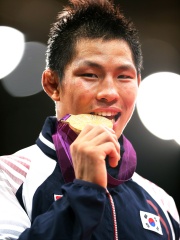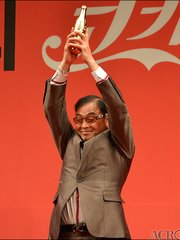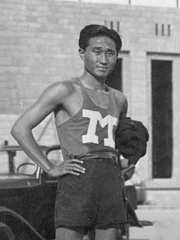

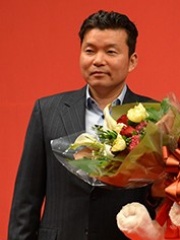
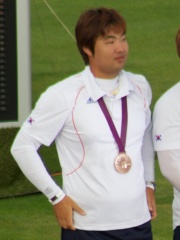
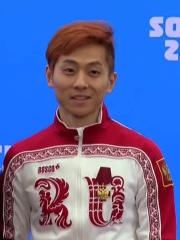
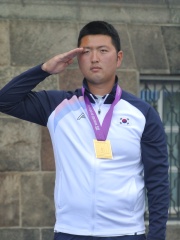
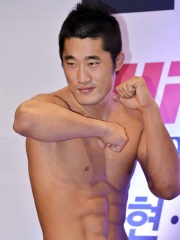
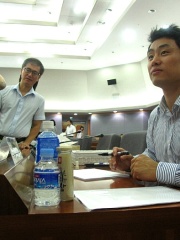
The Most Famous
ATHLETES from South Korea
This page contains a list of the greatest South Korean Athletes. The pantheon dataset contains 6,025 Athletes, 130 of which were born in South Korea. This makes South Korea the birth place of the 31st most number of Athletes behind India, and Belarus.
Top 10
The following people are considered by Pantheon to be the top 10 most legendary South Korean Athletes of all time. This list of famous South Korean Athletes is sorted by HPI (Historical Popularity Index), a metric that aggregates information on a biography's online popularity. Visit the rankings page to view the entire list of South Korean Athletes.

1. Nam Sung-yong (1912 - 2001)
With an HPI of 58.41, Nam Sung-yong is the most famous South Korean Athlete. His biography has been translated into 17 different languages on wikipedia.
Nam Sung-yong (November 23, 1912 – February 20, 2001) was a Korean Olympian who won a bronze medal in the marathon at the 1936 Summer Olympics, completing the run in 2 hours, 31 minutes, and 42 seconds. He was born in Junten (Suncheon), Korea, Empire of Japan and received higher education in Japan. Like the gold medalist Sohn Kee-chung, Nam Sung-yong used the Japanese pronunciation of his name, Nan Shōryū as Korea was then a part of the Japanese Empire. After the Olympics, Nam Sung-yong worked at the Korean Sporting Association with Sohn Kee-chung.

2. Park Sung-soo (1970 - 2025)
With an HPI of 56.98, Park Sung-soo is the 2nd most famous South Korean Athlete. His biography has been translated into 20 different languages.
Park Sung-soo (May 19, 1970 – August 27, 2025) was a South Korean archer and Olympic champion. He competed at the 1988 Summer Olympics in Seoul, where he won a gold medal with the South Korean archery team, and also an individual silver medal. Park has been a coach since 2000, including coaching Oh Jin Hyek as well as serving as head coach for the Korean national team at the 2024 Paris Olympics. Park was found dead on August 27, 2025, at the age of 55.

3. Hwang Young-cho (b. 1970)
With an HPI of 51.15, Hwang Young-cho is the 3rd most famous South Korean Athlete. His biography has been translated into 21 different languages.
Hwang Young-cho (Korean: 황영조; born 22 March 1970) is a former South Korean athlete, winner of the marathon race at the 1992 Summer Olympics and 1994 Asian Games.

4. Im Dong-hyun (b. 1986)
With an HPI of 50.46, Im Dong-hyun is the 4th most famous South Korean Athlete. His biography has been translated into 30 different languages.
Im Dong-hyun (Korean: 임동현; Korean pronunciation: [im.doŋ.ɦjʌn]; born 12 May 1986) is a South Korean archer. He competes for the South Korean national team and is a former world number one. He has 20/200 vision in his left eye and 20/100 vision in his right eye, meaning he needs to be 10 times closer to see objects clearly with his left eye, compared to someone with perfect vision.

5. Chun In-soo (b. 1965)
With an HPI of 49.11, Chun In-soo is the 5th most famous South Korean Athlete. His biography has been translated into 19 different languages.
Chun In-soo (Korean: 전인수; born July 13, 1965) is a South Korean archer and Olympic champion. He competed at the 1988 Summer Olympics in Seoul, and won a gold medal with the South Korean archery team. He also competed in the men's individual event at the 1984 Summer Olympics.

6. Viktor An (b. 1985)
With an HPI of 48.31, Viktor An is the 6th most famous South Korean Athlete. His biography has been translated into 36 different languages.
Viktor An (Russian: Виктор Ан; born Ahn Hyun-soo (Korean: 안현수) on November 23, 1985), is a South Korean-born Russian short-track speed skating coach and retired short-track speed skater. With a total of eight Olympic medals, six gold and two bronze, he is the only short track speed skater in Olympic history to win gold in every distance, and the first to win a medal in every distance at a single Games. He has the most Olympic gold medals in the sport, three of which he won in the 2006 Winter Olympics and the other three in the 2014 Winter Olympics. Considered to be the greatest short track speed skater of all time, he is a six-time overall World champion (2003–2007, 2014), two-time overall World Cup winner (2003–04, 2005–06), and the 2014 European champion. He holds the most overall titles at the World Short Track Speed Skating Championships, and is the only male short track skater to win five consecutive world titles. In 2008, Ahn suffered a knee injury and could not regain his health by the time the national qualifiers for Vancouver 2010 came around. His recovery being slow and his South Korean local team dissolved in 2010, Ahn, aiming for his second Olympics, became a Russian citizen the next year and began racing for the Russian team. After winning gold in Sochi, Ahn explained his reasons for joining the Russian team saying, "I wanted to train in the best possible environment and I proved my decision was not wrong." As expected, a gold-winning athlete leaving the national team caused public uproar in South Korea. However, it was aimed not at Ahn, but at the country's skating union. Most South Korean fans in a poll said they understood his decision. Ahn continued his skating career in his adopted nation until 2019 and declared his retirement in April 2020. In 2023, Ahn returned to Korea as a short track leader. Ahn returned to South Korea and applied to be a coach for Seongnam's short track speed skating team, despite having renounced his South Korean citizenship when becoming Russian. However, since his change in 2014 he had been increasingly criticized for his work in Russia amid the Russo-Ukrainian War and his coaching position in the Chinese team at the 2022 Winter Olympics in Beijing. Some Korean coaches have formed The Korea Skating Coaches' Union and urged "Seongnam to appoint a coach that meets the public eye level" and criticized Ahn that he "lied during the naturalization process and betrayed his country". and He was criticized by the public for betraying his country by transferring Korean sports skills to Russia and China. Ahn was eventually denied the coaching position due to significant public opposition. After being denied his position as Seongnam City Hall coach due to strong public opposition, Ahn explained the controversy he knew about his loss of nationality in advance and receives a full Olympic medal pension prior to Russian naturalization. He said: "I donated every pension I had received prior to naturalization". According to his explanation and a Korean ice skating official mentioned in Chosun Ilbo shortly thereafter, the entire lump sum pension he received was spent on rehabilitating "children who needed heart surgery and Korean junior players". And he make his first start as a Korean Sports leader, being named as a coach in the 2023–2024 national team trials at the request of his juniors. The Korea Skating Union officially announced this through Yonhap News Agency, and the Korean media reported it collectively.

7. Kim Woo-jin (b. 1992)
With an HPI of 48.18, Kim Woo-jin is the 7th most famous South Korean Athlete. His biography has been translated into 38 different languages.
Kim Woo-jin (Korean: 김우진; Korean pronunciation: [ki.mu.dʑin] or [kim] [u.dʑin]; born June 20, 1992) is a South Korean archer specializing in recurve archery. He first held the world number one ranking in 2011. At the 2016 Summer Olympics, he set a world record in men's individual recurve archery as well as won the gold medal as a member of the South Korean men's archery team. During the 2024 Summer Olympics, he earned an Olympic gold medal in the men's individual event after a tiebreaker with American archer Brady Ellison. This victory marked Kim's fifth gold medal overall and his third consecutive Olympics in which he won a gold medal. He is also a three-time world champion in the men's individual recurve event at the World Archery Championships. His record of five Olympic gold medals is the most won by any archer in the world, surpassing the four won by Kim Soo-nyung. It also makes him the most awarded Korean Olympian of all time in any sport. He is right-handed, and uses 30-inch (76 cm) arrows and a draw weight of 46 pounds (21 kg).

8. Dong Hyun Kim (b. 1981)
With an HPI of 48.15, Dong Hyun Kim is the 8th most famous South Korean Athlete. His biography has been translated into 16 different languages.
Kim Dong-hyun (Korean: 김동현; born November 17, 1981), anglicized as Dong Hyun Kim, is a South Korean retired mixed martial artist who most notably fought in the UFC's welterweight division. He was signed by the UFC after fighting in the Japanese promotion DEEP and in the South Korean promotion Spirit MC. Kim is also prominent as a regular cast member in variety shows Master in the House, DoReMi Market, The Return of Superman, and Strong Heart.

9. Song Dae-nam (b. 1979)
With an HPI of 47.99, Song Dae-nam is the 9th most famous South Korean Athlete. His biography has been translated into 23 different languages.
Song Dae-Nam (Korean: 송대남; Korean pronunciation: [soŋ.dɛ̝.nam]; born 5 April 1979 in Yongin, Gyeonggi Province) is a former South Korean judoka. Song rose to prominence when he won the gold medal in the middleweight division at the 2012 Olympics. He was then nominated as the flagbearer for Korea in the closing ceremony. He is best known as the head coach of the South Korea Men's National Team, having produced two world champions in his first year as head coach. Song moved up a weight class from half-middleweight to middleweight in 2012 after constant defeats to teammate Kim Jae-bum and inability to qualify for the Olympics in 2008.
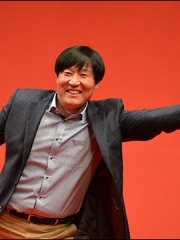
10. Kim Young-ho (b. 1971)
With an HPI of 47.85, Kim Young-ho is the 10th most famous South Korean Athlete. His biography has been translated into 18 different languages.
Kim Young-ho (born April 9, 1971 in Nonsan, Chungcheongnam-do, South Korea) is a South Korean foil fencer. At the 2000 Olympics in Sydney, he won the gold medal in individual foil, defeating Ralf Bissdorf of Germany in the final. He became the first Olympic Champion in fencing from Korea, and the first Asian man to win an Olympic Gold medal in fencing. At the 1997 World Championships he had perhaps one of the most heroic losses in top level fencing. With approximately 2 minutes left in the final period, Kim was down 11-3 to Sergei Golubitsky of Ukraine. As direct elimination fencing bouts go to 15 touches, most fencers would presume Kim was about done and was fencing for pride. 8 touches later Kim had tied the score. He and Golubitsky (as Sergei stated on his "Golden Bouts" tape, "and now the nightmare begins....the comeback of Kim") traded touches until Kim finally lost 15–14. At la belle (tied for the last touch, 14-14), Kim almost pulled the win out, but his attack failed to register (although he had struck valid target) and Golubitsky dodged a bullet, allowing him the chance to win the bout.
People
Pantheon has 130 people classified as South Korean athletes born between 1912 and 2007. Of these 130, 126 (96.92%) of them are still alive today. The most famous living South Korean athletes include Hwang Young-cho, Im Dong-hyun, and Chun In-soo. The most famous deceased South Korean athletes include Nam Sung-yong, Park Sung-soo, and Kim Nam-soon. As of April 2024, 32 new South Korean athletes have been added to Pantheon including Park Sung-soo, Chun In-soo, and Kim Jin-ho.
Living South Korean Athletes
Go to all RankingsHwang Young-cho
1970 - Present
HPI: 51.15
Im Dong-hyun
1986 - Present
HPI: 50.46
Chun In-soo
1965 - Present
HPI: 49.11
Viktor An
1985 - Present
HPI: 48.31
Kim Woo-jin
1992 - Present
HPI: 48.18
Dong Hyun Kim
1981 - Present
HPI: 48.15
Song Dae-nam
1979 - Present
HPI: 47.99
Kim Young-ho
1971 - Present
HPI: 47.85
Kim Jin-ho
1961 - Present
HPI: 47.70
Kim Ki-hoon
1967 - Present
HPI: 47.46
Lee Han-sup
1966 - Present
HPI: 47.44
Kim Jae-bum
1985 - Present
HPI: 47.36
Deceased South Korean Athletes
Go to all RankingsNam Sung-yong
1912 - 2001
HPI: 58.41
Park Sung-soo
1970 - 2025
HPI: 56.98
Kim Nam-soon
1980 - Present
HPI: 41.34
Oh Se-jong
1982 - 2016
HPI: 40.40
Newly Added South Korean Athletes (2025)
Go to all RankingsPark Sung-soo
1970 - 2025
HPI: 56.98
Chun In-soo
1965 - Present
HPI: 49.11
Kim Jin-ho
1961 - Present
HPI: 47.70
Lee Han-sup
1966 - Present
HPI: 47.44
Oh Kyo-moon
1972 - Present
HPI: 45.44
Yun Young-sook
1971 - Present
HPI: 44.19
Lee Bong-ju
1970 - Present
HPI: 42.50
Yoon Hye-young
1977 - Present
HPI: 42.25
Kim Kyong-hun
1975 - Present
HPI: 42.21
Moon Dae-sung
1976 - Present
HPI: 41.54
Kim Nam-soon
1980 - Present
HPI: 41.34
Jang Yong-ho
1976 - Present
HPI: 40.93




